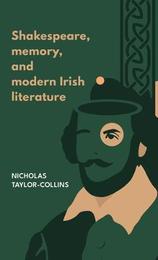
|
Shakespeare, Memory, and Modern Irish Literature
Hardback
Main Details
| Title |
Shakespeare, Memory, and Modern Irish Literature
|
| Authors and Contributors |
By (author) Nicholas Taylor-Collins
|
| Physical Properties |
| Format:Hardback | | Pages:328 | | Dimensions(mm): Height 216,Width 138 |
|
| Category/Genre | Literary theory
Literary studies - fiction, novelists and prose writers |
|---|
| ISBN/Barcode |
9781526149619
|
| Classifications | Dewey:820.99415 |
|---|
| Audience | |
|---|
|
Publishing Details |
| Publisher |
Manchester University Press
|
| Imprint |
Manchester University Press
|
| NZ Release Date |
31 January 2023 |
| Publication Country |
United Kingdom
|
Description
This original and innovative book proposes 'dismemory' as a new form of intertextual engagement with Shakespeare by modern and contemporary Irish writers. Through reflection on these canonical writers and ranging across thirteen Shakespeare plays, Taylor-Collins demonstrates how Irish writers who helped to fashion and critique the Irish nation state carry an indelible, if often subdued, mark of Shakespeare's early modern English influence. The volume overall renews and revitalises the Shakespeare-modern Ireland connection: Taylor-Collins reveals Hamlet's hauntological legacy in Playboy of the Western World, Ulysses, and Ghosts; how the corporal economies that exert pressure from Coriolanus and Ben Jonson flicker through to the antiheroes in Beckett's Three Novels; and how the landed legacies of territorial contests in Shakespeare are engaged with in Yeats's poetry, and similarly how the diseased muddiness in Hamlet is addressed by Heaney.
Author Biography
Nicholas Taylor-Collins is Senior Lecturer of English at Cardiff Metropolitan University -- .
Reviews'Breath-taking in an imaginative audacity tempered only by scholarly scruple, this study shows just how much of the modern Irish mind Shakespeare invented. Nick Taylor-Collins's text crackles with new ideas: it is a work of passion and truth. It shows just how deeply Irish writers illuminate the Bard who in turn lights up their texts. The author has the gift of explanation without simplification. Its writer combines a fine alertness to the nuances of language along with a deep understanding of the socio-cultural matrices out of which all literature springs. The result is a magnificent evocation of the ways in which writers take fire from one another ... and even reinvent their predecessors.' Declan Kiberd, Professor Emeritus, Notre Dame University -- .
|